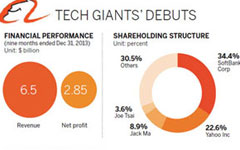|
 Top Chinese ecommerce conglomerate Alibaba Group Holding Ltd has given crossborder business a strong push by announcing plans to buy a stake in Singapore Post Ltd, a move that for the first time directly connects China’s ecommerce system with overseas logistics. [Photo / Xinhua]
|
Top Chinese e-commerce conglomerate Alibaba Group Holding Ltd has given cross-border business a strong push by announcing its plans to buy a stake in Singapore Post Ltd, a move that for the first time directly connects China's e-commerce system with overseas logistics.
The two sides announced on Wednesday that SingPost and Alibaba Investment Ltd, a wholly owned subsidiary of Alibaba Group, have entered into an investment agreement under which Alibaba Investment will invest S$312.5 million ($249 million) to purchase 30 million existing ordinary shares and 190.096 million new ordinary shares, to allow Alibaba to take a 10.35 percent stake in SingPost upon completion.
|
 |
|
 |
Alibaba and the publicly traded SingPost also inked a memorandum of understanding to build an "international e-commerce logistics platform”, aiming to seize an e-commerce opportunity in Southeast Asia's potentially huge market.
According to Alibaba's statement on Wednesday, the collaboration will give the Hangzhou-based e-commerce giant access to SingPost's international logistics capabilities, infrastructure and delivery networks.
Alibaba Group Chief Operating Officer Daniel Zhang said in a statement that the deal will allow Alibaba to "leverage SingPost's strong delivery networks and end-to-end e-commerce logistics solutions to facilitate international e-commerce."
Finding cross-border solutions has been one of Alibaba's top priorities as the company is already the dominant player inside China, controlling more than 80 percent of the country's online shopping market, said analysts.
"Logistics and delivery are the most difficult part to develop in cross-border e-commerce,"said Lu Zhenwang, an independent Internet expert and chief executive officer of the Shanghai-based Wanqing Consultancy. "With its investment in SingPost, Alibaba has largely improved its weakest link in terms of expanding to overseas markets."
This week, Alibaba also announced it had struck a deal with Australia Post to help more Western merchants sell to Chinese consumers through Alibaba's Tmall.com, China's No 1 business-to-customer platform. The deal is expected to speed up package deliveries for Chinese customers who purchase overseas products on Tmall.com.
It is clear that Alibaba has been moving quickly in terms of internationalization. The group, which is heading to one of the largest initial public offerings ever seen in the United States, signed an agreement with the French government about a week ago to boost that country's exports to China via its e-commerce platforms.
A similar deal was signed between Alibaba and UK Trade & Investment in December last year to help promote made-in-Britain merchandise among China's increasingly wealthy online shoppers.
However, rather than helping Chinese online shoppers to buy from the Singapore market, the investment into SingPost is likely to boost only Chinese exports to the Southeast Asia market, Lu said.
"It is not easy to attract Western buyers to make purchases in China through Alibaba's e-commerce platform given the difference in language and culture, among others. But most of the population of Singapore is Chinese, so the investment into SingPost can help Alibaba to actually gain some solid market share in e-commerce markets outside China,"he said.
The Asia-Pacific region is becoming the largest regional e-commerce market in the world, with online transactions expected to hit more than $1 trillion by 2020, according to eMarketer.
